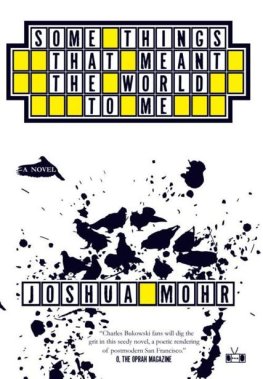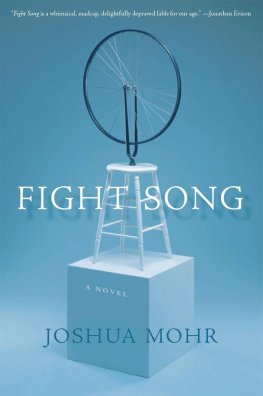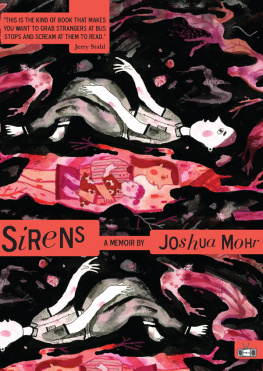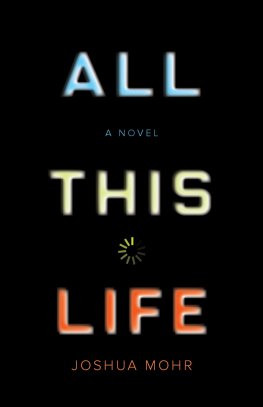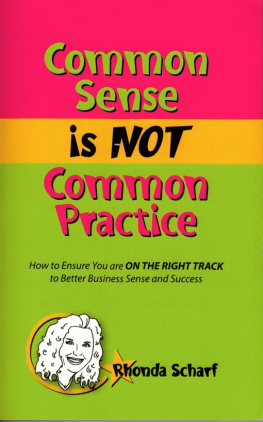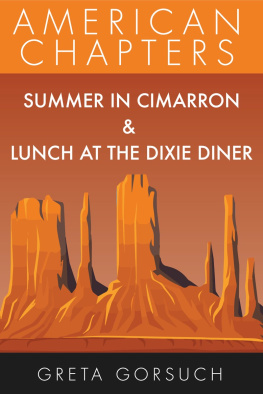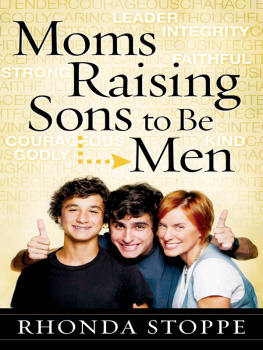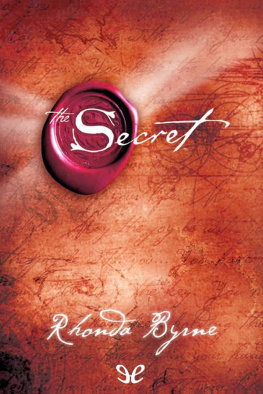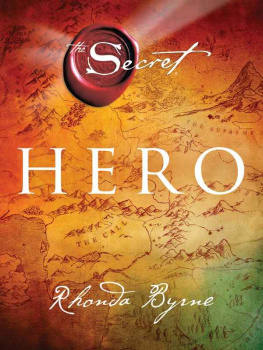Joshua Mohr
Some Things That Meant the World to Me
"It takes a lot of whiskey to make these nightmares go away"
Tom Waits

I'd like to brag about the night I saved a hooker's life. Like to tell you how quiet everything else in the world was while I helped her. This was in San Francisco. Late 2007. I'd been drinking in Damascus, which was painted entirely black floor, walls, and ceiling. Being surrounded by all that darkness had this slowing effect on time, like a shunned astronaut meandering in space. It was a Wednesday night, seemed like any other, but that was the way my life worked, things appearing one way and then getting poisoned.
And I'll tell you about other things, too. We'll talk about the past: the drifting house, my mom, Letch, the sidewinders, Dr. Angel-Hair. There's no way around those things.
Me, Rhonda, the hero.
They doused me in drugs and doctors and words, so many words, trying to make me see some lukewarm world. But I didn't. I don't.
So listen to me.
I was unemployed again but the bartender at Damascus used to work at a restaurant where I was a line cook, so he let me drink for free. I sidled in about ten at night and sat down next to a guy in a bowler hat, who offered to buy me a warm beer. I accepted and he said, "I'm wearing a diaper," and smiled; his teeth looked like frozen ginger ale.
His name was Vern. People had tried to introduce me to him before, but those times he'd been in blackouts, yelling things like, "That's no way to talk to your commanding officer!" He drank warm beers because the cold ones made his ancient teeth ache. His brand of choice was Michelob, and the bartenders at Damascus always kept a warm stash for Vern.
"Why a diaper?" I said, a familiar buzz slithering through my hands. Sometimes they felt like maracas: hollowed out, something bouncing around inside the skin.
"Gotta be ready for anything," Vern said and paid for the warm ones. "Like war." He took his bowler hat off and set it on the bar. Vern must have been seventy. He was bald. The hair he didn't have on top of his head, he made up for with eyebrows, fierce tangles of curly hair, long and rolled like handlebar mustaches.
The bartender set the beers down and walked away to help someone else.
"You got a problem with my diaper, boy?" Vern said.
Just last week, I'd seen him spit warm beer in a man's face because the guy was wearing a Dead Kennedys shirt. "I know that's a band," Vern had said to him, "but those dead Kennedy brothers may have saved our country. Now we live in a hive of shit." That was when he spit on him. The guy was probably forty years younger than Vern, but he didn't do anything about it, didn't even answer. Wiped the beer out of his eyes and walked away. He, like the rest of us, assumed if Vern was nuts enough to act that way he must know some cagey ways to bring men down.
My hands weren't physically shaking, so maybe maracas didn't really describe them. Maybe they were more like bags of microwave popcorn, inflating with violence as the kernels exploded. Dr. Angel-Hair used to say that the buzzing hands were because of my disorders. That I'd had a dissociative fugue. That I suffered from depersonalization, but that name always felt phony. Wasn't it exactly the opposite? I wasn't depersonalized. I was more of a person. I felt more, never went an hour without my maracas writhing and jerking and thrumming.
Vern waited for me to respond, and when he realized I wasn't going to say anything he said, "That's a good little boy," spanking himself and holding his warm beer up between us. I extended mine, our bottles touching.
"The older the buck," he said, "the harder the horns."
We drank.
His eyes glazed over, mouth hanging open.
"Are you okay?" I said.
Vern twirled the long matted hairs of one of his eyebrows, didn't answer for a few seconds. "Am now Look," he said and pointed at his crotch: "No leaks."
I didn't want to sit with him or his temper or the blaring ways he reminded me of Letch, good and bad. I thanked him for the warm one and went outside to smoke.
Only two drags into my cigarette and I heard some muffled gagging noises coming from down the block, maybe twenty feet away. I could see two people, could hear a man's voice saying things but couldn't make out his words.
"Everything all right?" I said.
More choking noises.
A woman said, "Please."
I said, "You okay?"
A man said, "No worry for you," and he whispered something to the woman that I couldn't hear.
She stopped begging-
My maracas shook in ugly seizures.
I looked up and down the street, took a few steps toward the couple, tossed my cigarette down, and heard the harsh sound of weight being thrown against a corrugated garage door, the man's silhouette slamming the woman into the clamoring metal, two times, three times, four. He pulled his hand back and slapped her and she fell to the sidewalk, and the man, still standing, his legs splayed to straddle her face, leaned over and choked her again. He picked her head up and shook it, hit it on the concrete.
"Stop!" I said.
I ran at him. He kept choking her. I kept running and he kept choking, and I was there. I was with them. I was with her. And this was when the world forfeited its volume, the three of us engulfed in a gaping quiet. We were there. Breathing. Tussling. We manufactured our normal human noises, but I couldn't hear any of them because I was helping her.
I punched him in the cheek and he fell down, springing back up and running away
"You all right?" I said, and she blinked her eyes slower than I'd ever seen anyone blink, so slow, like she'd just woken from a coma after decades of devastating sleep. Her creaking atrophied eyelids bouncing, adjusting to the new light, this new world. She kept blinking, and I told her to go to Damascus and have them call the cops. She nodded, another new movement, testing the neck after all those years frozen. "Do you know what to do?" I said and another nod from her, and I said, "You're safe," and bolted after him, having no idea what I'd do if I caught up, and even with a pack-a-day habit, I ran fast, Olympic fast. Soon I gained on him, feeling my adrenaline, the venom that lets mothers lift cars off their children's legs, rollicking in me. I could feel it hurtle through my veins, demanding revenge, demanding that this man pay for what he'd done. He couldn't treat her like this; people couldn't treat others any awful way they wanted to. I'd made sure Letch learned that lesson, and I'd teach this guy the same thing. He was only a step ahead of me so I jumped on him, wrapped my arms around his waist, pulling him down, both of us crashing into the sidewalk, in a flailing heap.
I grabbed his hair. Cocked my arm back. Ready to smash one of my microwave popcorn bags into his face. But before I brought my fist to his mouth, he hit me. Hard. He was a southpaw, and what must have been his wedding ring cut into my nose. It had some kind of gem jetting up from the band because something sharp, like a nail, punctured my skin. My nose leaking blood. I brought my hands up to cover my face. He hit me again. I dropped to the ground. He kicked me. In the ribs and the face. Six times. He left me there.

Me, Rhonda, limping back to the bar. I fished a crumpled newspaper from the gutter to wipe at my nose, smeared blood all over the front page, all over a picture of President Bush, another baffled expression spattered across his face. I balled it up and threw it in the gutter, next to a tipped over construction cone. I staggered past a homeless man pushing a shopping cart full of plastic orange jack-o-lanterns; he had a sign hanging from the front of the cart that said Donate to the United Negro Pi~ZZa Fund.

